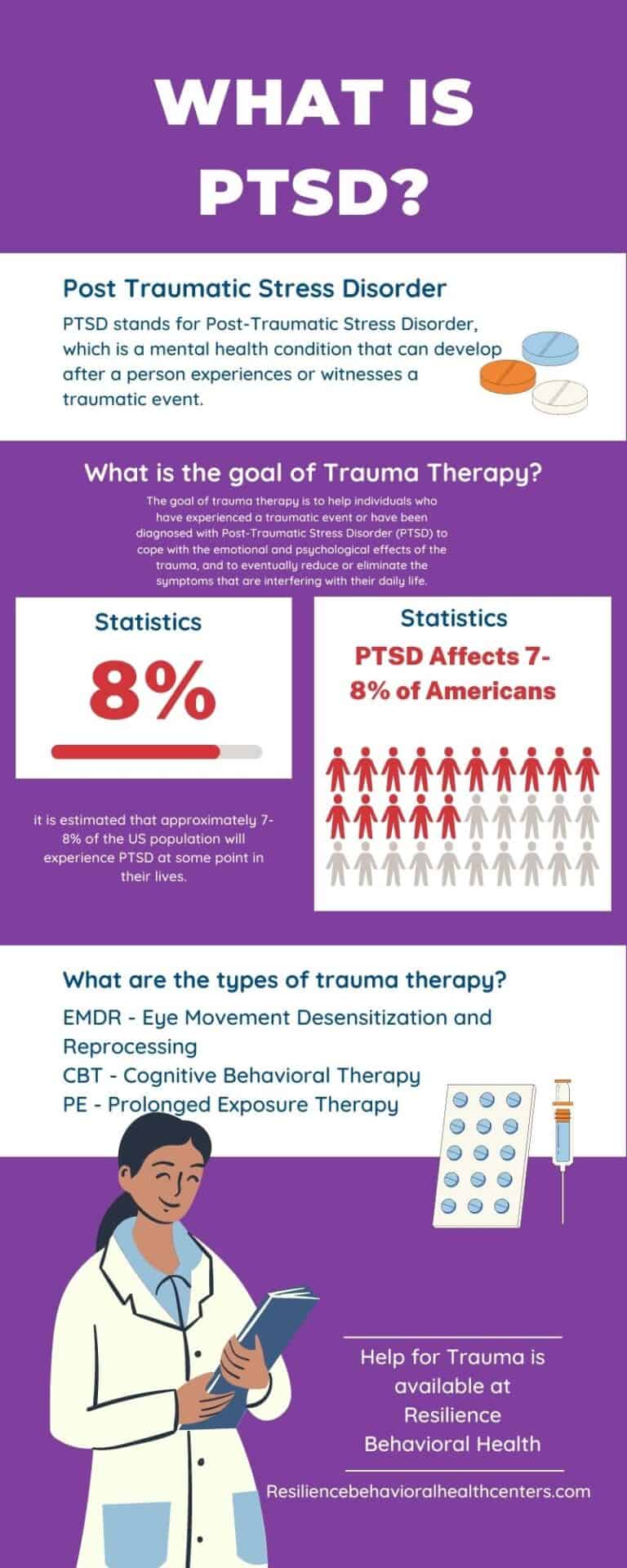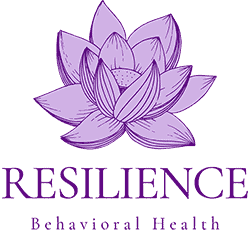What is PTSD Treatment?
Post-Traumatic Stress Disorder, which is a mental health condition that can develop after a person experiences or witnesses a traumatic event. Traumatic events can include natural disasters, serious accidents, physical or sexual assault, combat or war, and other types of violence.
It can cause a variety of symptoms, including intrusive thoughts or memories about the traumatic event. Also, avoidance of reminders of the event, negative changes in thoughts or mood, and changes in emotional reactions. It entails being easily startled, irritable, or hypervigilant. These symptoms can interfere with a person’s ability to function in their daily life and can cause significant distress.
Treatment for PTSD often involves therapy, such as cognitive behavioral therapy. or exposure therapy. As well as medication in some cases. With appropriate treatment, many people with PTSD are able to manage their symptoms and improve their quality of life.
Resilience Behavioral Health incorporates PTSD Treatment into the milieu of our Intensive Outpatient Program.

What is the goal of PTSD Treatment and Trauma Therapy?
The goal of trauma therapy is to help individuals who have experienced a traumatic event. It also help those who have been been diagnosed with Post-Traumatic Stress Disorder (PTSD) to cope. It helps cope with the emotional and psychological effects of the trauma. And to eventually reduce or eliminate the symptoms that are interfering with their daily life. Trauma therapy can help individuals process their experiences and emotions in a safe and supportive environment. It enables them to move forward in their lives.
What types of therapy treat PTSD?
There are different types of trauma therapy that may be used, depending on the individual’s needs and preferences. Some of the most common types of trauma therapy include:
Cognitive-behavioral therapy (CBT): This type of therapy focuses on identifying and changing negative thoughts and behaviors that are contributing to symptoms of PTSD.
Eye Movement Desensitization and Reprocessing (EMDR): EMDR uses bilateral stimulation (such as eye movements, taps, or tones) to help individuals process traumatic memories.
Trauma-focused cognitive-behavioral therapy (TF-CBT): This type of therapy is specifically designed for children and adolescents who have experienced trauma, and includes both individual and family therapy.
Group therapy: Group therapy can provide a supportive environment where individuals can share their experiences and learn from others who have gone through similar experiences.
The overall goal of trauma therapy is to help individuals regain a sense of control over their lives. It helps build resilience, and improve their overall well-being.
How many Americans suffer from PTSD?
The exact prevalence of PTSD (Post-Traumatic Stress Disorder) in the United States is difficult to determine, as it can be underreported or misdiagnosed. However, it is estimated that approximately 7-8% of the US population will experience PTSD at some point in their lives.
According to the National Center for PTSD, about 60% of men and 50% of women experience at least one traumatic event in their lifetime. Among those who experience trauma, approximately 8% of men and 20% of women will develop PTSD.
In addition, some populations are at higher risk for developing PTSD. This includes military service members and veterans, survivors of sexual assault or physical violence. It can be prevalent among first responders such as police officers and firefighters.
How prevalent is PTSD with co-occurring Substance use Disorder?
There is a high prevalence of co-occurring Substance Use Disorder (SUD) among individuals with PTSD (Post-Traumatic Stress Disorder). According to the National Center for PTSD, about half of individuals with PTSD also have a co-occurring SUD.
The relationship between PTSD and SUD is complex and bidirectional. This means that one disorder can contribute to the development or exacerbation of the other. Individuals with PTSD may turn to drugs or alcohol as a way to cope with their symptoms. Substance use can also increase the risk of developing PTSD after a traumatic event.
Effective treatment for individuals with co-occurring PTSD and SUD typically involves an integrated approach that addresses both disorders simultaneously. This may include various forms of therapy, such as cognitive-behavioral therapy, trauma-focused therapy, and motivational interviewing. In some cases we use medication-assisted treatment for SUD and Trauma.
How much does PTSD Treatment cost?
The cost of PTSD (Post-Traumatic Stress Disorder) treatment can vary widely depending on a number of factors, such as the type and duration of treatment. The location of the treatment center, and the individual’s insurance coverage play a role.
Some forms of PTSD treatment, such as medication and therapy, may be covered by health insurance, including Medicaid and Medicare. However, coverage and out-of-pocket costs can vary widely depending on the insurance plan and the specific treatment being sought.
The cost of therapy for PTSD can vary depending on the type of therapy, the frequency and duration of sessions, and the location of the therapist.
Some treatment centers may offer specialized PTSD treatment programs, such as inpatient or outpatient programs, which may have higher costs than individual therapy. The cost of such programs can range from several thousand dollars to tens of thousands of dollars, depending on the length and intensity of the program.
Overall, the cost of PTSD treatment can be significant, but there are options for those who are uninsured or underinsured, including community mental health centers and low-cost therapy options. It is also important to note that many treatment providers offer sliding-scale fees or other forms of financial assistance for those who may not be able to afford the full cost of treatment.
For a free and completely confidential PTSD Treatment cage Assessment call Resilience Behavioral Health today at (888)-401-1179


